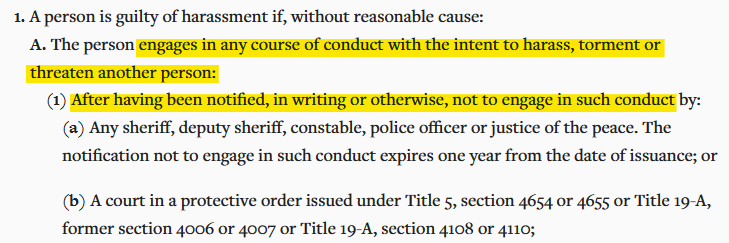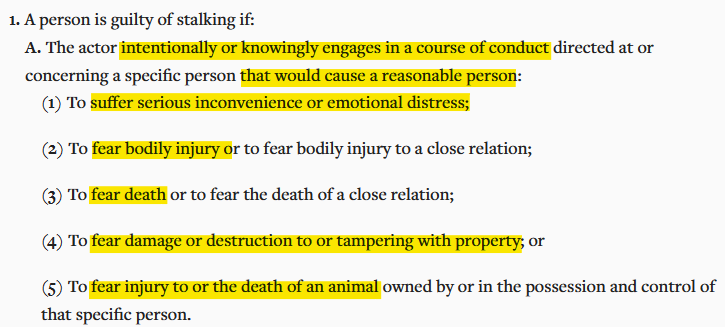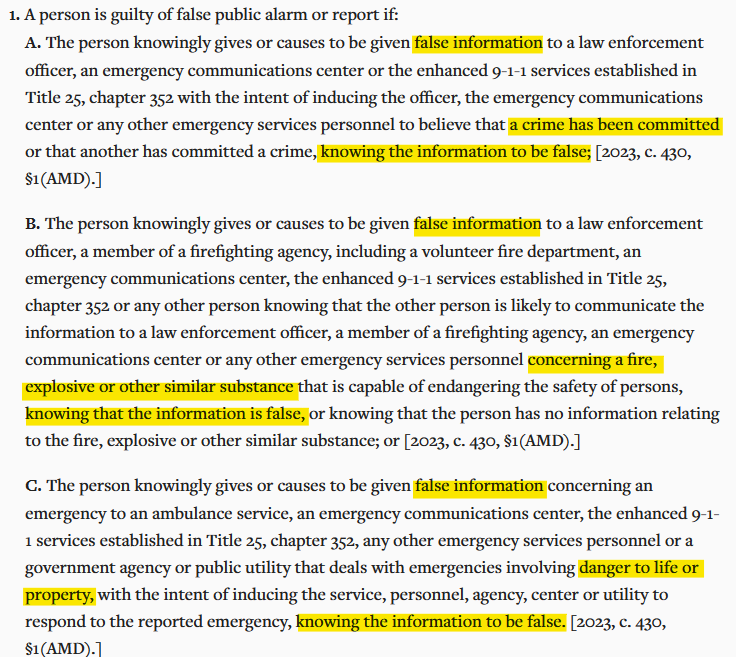Is Doxxing Illegal In Maine?
Laura Martisiute
Reading time: 5 minutes

Table of Contents
Mainers interested in protecting their online privacy might wonder: Is doxxing illegal in Maine?
Read on to find out whether sharing other people’s information online is against the law in Maine and how doxxing-related crimes are handled in the state.
Is Doxxing Illegal in Maine?
No. The act of doxxing, or publishing someone else’s personal information online, without their permission is not expressly against the law in Maine.
However, doxxing can lead to several other activities that are illegal in the state.
Doxxing Related Activities That Are Illegal in Maine
Even though Maine doesn’t have an anti-doxxing law, there are several doxxing-adjacent crimes that you could be vulnerable to if you’ve been doxxed.
These include harassment, stalking, trespass, and swatting.
Harassment
When someone engages in tormenting or threatening behavior against you after being warned to stop by a law enforcement officer, they’re committing harassment in Maine (Me. Stat. tit. 17-A § 506-A).

This is a Class E crime in Maine, punishable by up to six months’ imprisonment and fine of up to $1,000.
Harassment by telephone or electronic communication device
If someone calls, texts, or messages you with harassing or obscene communications (including images or videos), or if they repeatedly call you for no reason, they could be found guilty of harassment by telephone or by an electronic communication device in Maine (Me. Stat. tit. 17-A § 506).
Harassment by telephone or electronic communication device is a Class E crime with charges of up to six months in jail and a fine of up to $1,000.
Stalking
Once your contact information and home address are made public, you are more susceptible to stalking (Me. Stat. tit. 17-A § 210-A).
In Maine, stalking is defined as a course of conduct that makes you fear for your safety or that of your close family or pets.

Stalking is a Class D crime in Maine, and offenders could face up to 364 days of incarceration and a fine of up to $2,000.
Criminal trespass
Trespassing (Me. Stat. tit. 17-A § 402) occurs in Maine when someone enters a place they shouldn’t be in.
If it’s a dwelling (such as your home), it’s a Class D crime punishable by up to 364 days in jail and up to $2,000 in fines.
If the place in question isn’t a dwelling but is still locked or barred (such as your barn), it’s considered a Class E crime, leading to a penalty of up to six months in jail and up to $1,000 in fines.
False public alarm or report
One of the more dangerous activities associated with being doxxed is being swatted, which occurs when someone who knows your home address calls law enforcement with a report of an in-progress dangerous crime.
In Maine, this is punishable as making a false public alarm or report (Me. Stat. tit. 17-A § 509).

This is a Class D crime, entailing up to 364 days’ imprisonment and a fine of up to $2,000.
Is Doxxing Illegal at the Federal Level?
There is currently no federal law against doxxing. That’s partly because doxxing frequently involves publicly available information.
Despite this, several states (including California, Arizona, and Illinois) have criminalized doxxing.
Even though doxxing is not illegal federally or in Maine, you can (and should) protect yourself from being doxxed.
How to Protect Yourself Against Doxxing In Maine (And Elsewhere)
To protect yourself from being doxxed, you’ll need to shrink your online footprint to limit the amount of publicly available information about you on the internet.
The best way to find out where that information is showing up is to get ahead of bad actors and dox yourself (find out how in our step-by-step guide to self-doxxing with this list of doxxing tools).
Once you’ve doxxed yourself, you’ll likely find your personal data in several different places online.
To delete or hide this information, you’ll need to take a number of steps, which may include:
- Changing the privacy settings on your social media accounts from public to private.
- Opting out of data brokers, which are companies that collect and sell your personal information. You will need to opt out of every data broker with a profile on you, and you’ll probably have to repeat the process down the line, as data brokers routinely reactivate old profiles when they find new information. As an alternative, you can subscribe to a data removal service such as DeleteMe to have privacy experts handle the opt-out process for you.
- Changing your usernames and using unique ones moving forward to prevent bad actors from following you across the internet.
- Using password managers and multi-factor authentication to make it harder for bad actors to access your accounts and your personal data.
- Avoiding downloading unnecessary apps, and removing unused apps.
- Requesting the removal of your data from Google services.
- Limiting how much personal information you share online.
To learn more, read our guide on how to prevent doxxing.
Our privacy advisors:
- Continuously find and remove your sensitive data online
- Stop companies from selling your data – all year long
- Have removed 35M+ records
of personal data from the web
Save 10% on any individual and
family privacy plan
with code: BLOG10
news?
Don’t have the time?
DeleteMe is our premium privacy service that removes you from more than 750 data brokers like Whitepages, Spokeo, BeenVerified, plus many more.
Save 10% on DeleteMe when you use the code BLOG10.

















